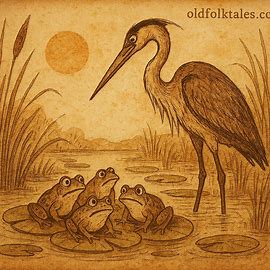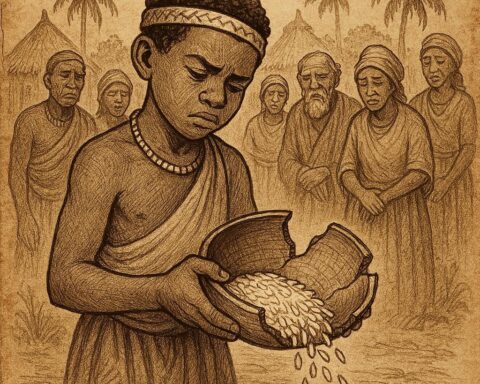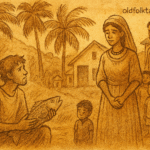Long ago, in the land of the Kimbundu people of Angola, there lived a man named Ngana Kimalauezu kia Tumb’a Ndala and his wife. They shared a life together, modest but peaceful, until one day change entered their home. The woman conceived, and with her pregnancy came a strange craving. She could not bear the sight of meat or any other food. Her heart and stomach longed only for fish.
Each time Ngana Kimalauezu went fishing, he brought back plentiful catches to satisfy her. But as he continued, the river grew empty. The fish, sensing the relentless nets, fled to another river, leaving his usual waters barren. His wife, however, still longed for fish, and her desire grew sharper with each passing day.
One morning, Ngana Kimalauezu spoke to his wife. “Prepare me food, for I must go fishing again,” he said. She cooked for him, and once he had eaten, he set off for the distant river where the fish had fled. There he built a small shelter by the bank, sat down to rest, and then cast his net into the water.
READ THIS: Fenda Maria and Nga Nzua: An Angolan Folktale of Truth, Resilience, and Justice.
The first cast returned nothing.
The second cast was also empty.
On the third cast, however, the net grew heavy. He felt a weight unlike any before. From beneath the water came a voice:
“Wait, please! Because thy friend is the father of a child.”
The fisherman paused, bewildered, as the current lapped around him. After a moment, the voice came again:
“Pull now!”
He heaved with all his strength and drew up a single massive fish, so large it seemed almost otherworldly. He placed it into his basket and began walking home. Yet he soon realized he was not alone. As he walked, other fish followed in a procession behind the great one, their bodies slipping through the grasses with a sound like whispers: ualala, ualala!
When Ngana Kimalauezu neared his village, his wife came running to meet him, accompanied by neighbours eager to see what he had caught. They followed him home, where he laid down the great fish. His wife looked upon it with shining eyes and said, “Husband, scale it!”
But Ngana Kimalauezu shook his head. “I will not.”
Determined, the wife took up the task herself. Yet as she began scraping the scales, the fish began to sing:
“When thou me scalest, scale me well!
When thou me scalest, scale me well!”
Its eerie voice filled the air, chilling those who heard it. Still, the wife continued until the fish was fully scaled. She then placed it into the pot to cook. But even as it boiled, the fish kept singing the same haunting refrain.
At last, the fish was done. The woman prepared five plates of food and invited her husband and neighbours to eat. But none accepted her offer. Whether out of fear or suspicion, they all refused. So, the woman sat alone and ate every piece herself.
When she had finished, she lit her pipe and carried her mat outside into the open air. There she sat, smoking quietly, when suddenly a strange voice rose, not from around her, but from within her own belly.
“Where shall I get out?” the voice asked.
The woman, startled but proud, answered, “Get out by the soles of my feet.”
But the voice of the fish replied, “By thy feet, wherewith thou art want to tread on dirt, there shall I get out?”
The woman frowned and said, “Then get out by the mouth.”
Again, the fish’s voice replied, “By thy mouth, where thou didst swallow me, there shall I get out?”
Exasperated, she said, “Seek wherever thou wishest.”
Then the fish declared, “Then I get out here!”
At that moment, her belly split open, bursting in the middle. The fish emerged alive and whole, slipping away into freedom. The woman, destroyed by her desire, was left no more.
Moral Lesson
This tale warns against the dangers of unchecked craving and selfishness. The woman’s longing for fish consumed her so deeply that she ignored every warning sign, the strange voice from the river, the singing of the fish, the refusal of her neighbours. Her insistence on satisfying herself alone led to her ruin.
The story reminds us that desire must be tempered with wisdom and restraint. To take without heed, to consume without sharing or humility, can bring destruction not only to oneself but also to the balance between human life and the natural world.
Knowledge Check
1. Who are the main characters in “The Woman Who Longed for Fish”?
Ngana Kimalauezu kia Tumb’a Ndala and his wife.
2. What unusual craving did the wife have during her pregnancy?
She longed only for fish and rejected all other foods.
3. How did the man finally catch the great fish?
On his third attempt, after a mysterious voice told him to wait and then to pull.
4. What strange behavior did the fish display when caught?
It sang repeatedly while being scaled and cooked.
5. Why did the woman’s neighbors refuse to eat the fish?
They feared or distrusted it because of its unnatural singing.
6. What happened to the woman after she ate the fish alone?
The fish tore out of her belly, and she perished.
Source
Source: Traditional folktale from the Kimbundu people of Angola.







